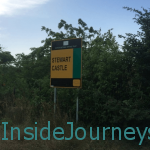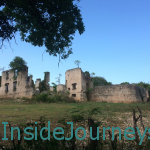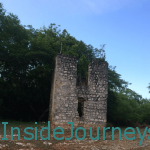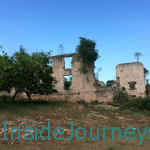A year or so ago, Dr. Ivor Connolley of Falmouth Heritage Renewal asked me to join them for a site visit to Stewart Castle. I was unable to go but I was curious and intrigued.
A castle – in Jamaica? Where was this Stewart Castle and why hadn’t I heard of it before?
But as happens sometimes, life got in the way and I forgot about Stewart Castle. Then on one of my trips to Kingston, I spotted its hard-to-miss yellow, black and green sign about ten miles from Falmouth, capital of Trelawny. So that’s where it is, I thought to myself. The next time, I decided to stop.
Stewart Castle is a fortified cut-stone mansion that was owned by James Stewart who came to the island from Scotland in 1754. By 1756, he owned 167 acres. The Castle was built around 1880.
I didn’t know what to expect as we turned off the main highway on to Stewart Castle Drive, a bumpy road that is overgrown, in parts, by a variety of shrubs that I didn’t recognize, and trees. We followed Stewart Castle Drive, which is no wider than one lane, as it meanders through a small community of modest homes, looking for the Castle. After about a half mile, we saw the turn off.
Situated on a small hill, its location would have given James Stewart clear views of his workers below. (If you’ve been reading my blog about plantation houses in Jamaica, you’ll notice that they were all built at higher elevations offering the owners unobstructed views of their operations.)
Though now in ruins and surrounded by a thicket of fruit and other trees, it isn’t hard to imagine how Stewart Castle might have looked back when the estate hummed with the activities of the three-story main house and a sugar works.
The amenities included a cellar, indoor water tank and a fortified outhouse. In addition, there were indoor gun ports, and a perimeter wall protected the estate and the family from attack.
By 1799, Stewart Castle had expanded to 1200 acres, including quarters for the 300 slaves who kept the sugar works in operation. With its proximity to the Caribbean Sea, there probably would have also had a jetty to load sugar for transport to ships in Falmouth harbor.
Although the castle’s stone-cut walls still look relatively solid from a distance, I didn’t get too close as I was unsure of the condition of the structure, and I might add, I’m afraid of things that creep and crawl. I didn’t do much exploring of the grounds so I’m not sure what, if anything, remains of the sugar works.

Stewart Castle remained in the Stewart family for three generations. It passed to Stewart’s son, also named James, who established Stewart Town, a community in Trelawny, and became custos of the parish in 1812.
The estate changed hands several more times before Kaiser Bauxite Company bought it in 1930 and turned over the Castle, in ruins, in 1960, to the Jamaica National Heritage Trust Company.
Archeological digs on the property have unearthed a Taino site. There have been proposals to transform the property into a park.
JB Kidd’s painting of Stewart Castle from daacs.org.
This week, I’m linking this post to Budget Traveler’s Sandbox and Travel Photo Monday. Be sure to check out the other photos that are posted there.













Interesting story, Marcia 🙂
I love castle ruins although I have to admit I never would have expected one on Jamaica.
Great photos
I love Castle ruins although I have to admit I never expected to find one on Jamaica.
Great photos
Marcia, I think it’s great Jamaica has a castle. I saw a photo not too long ago on Pinterest and wanted to check it out, but now I don’t have to do the research! Great article.